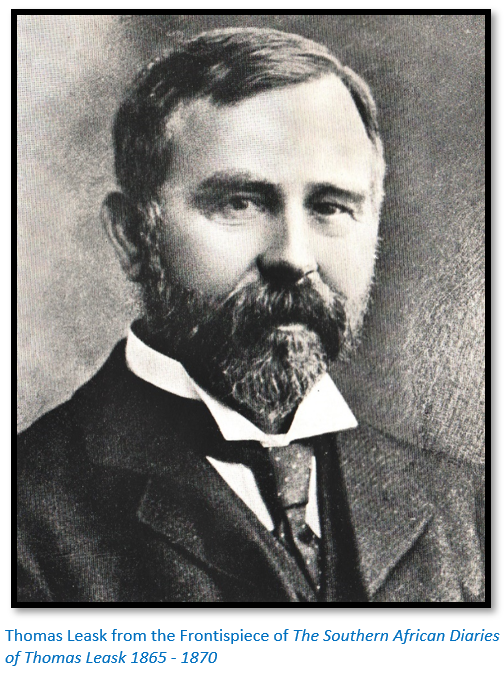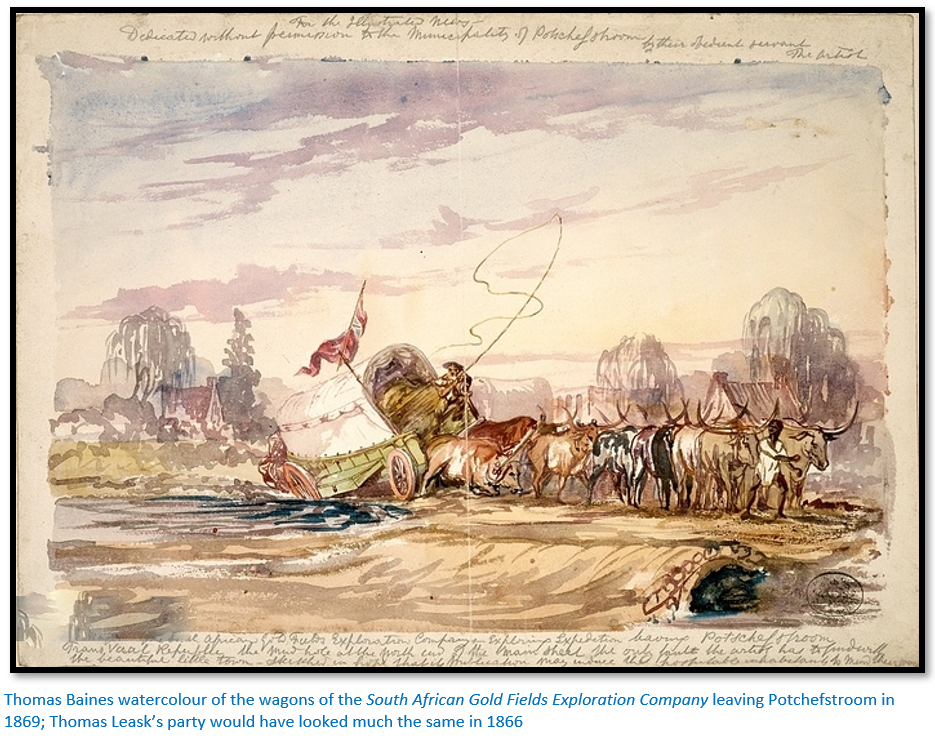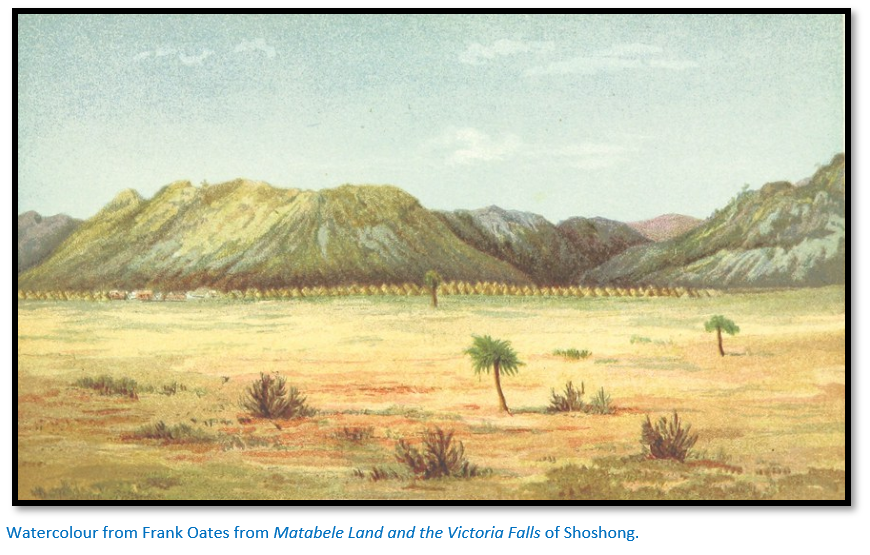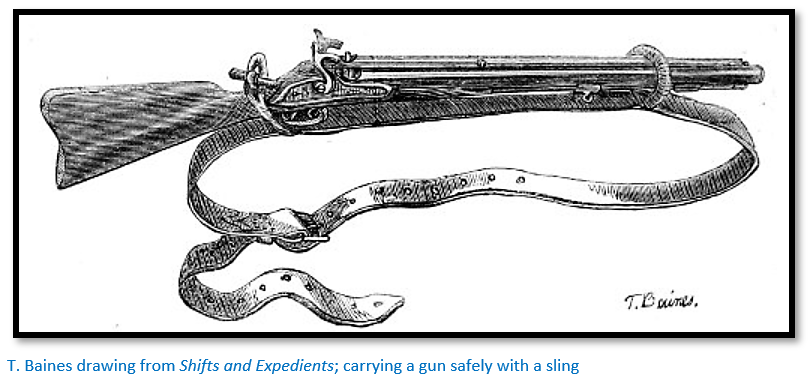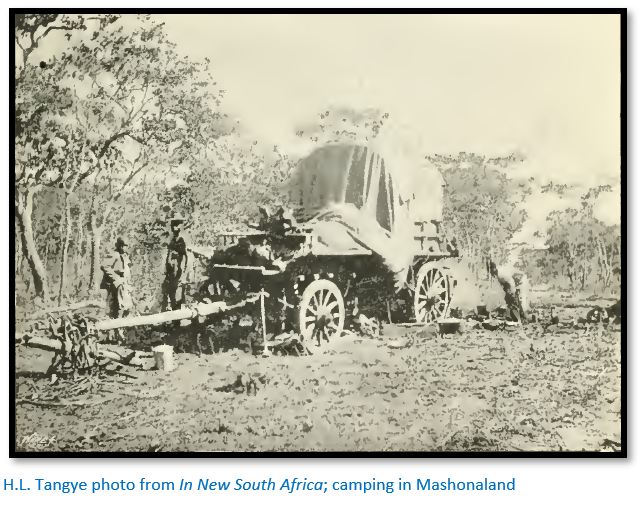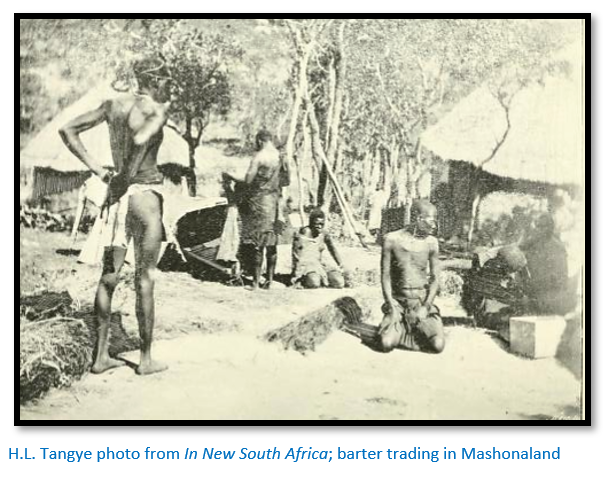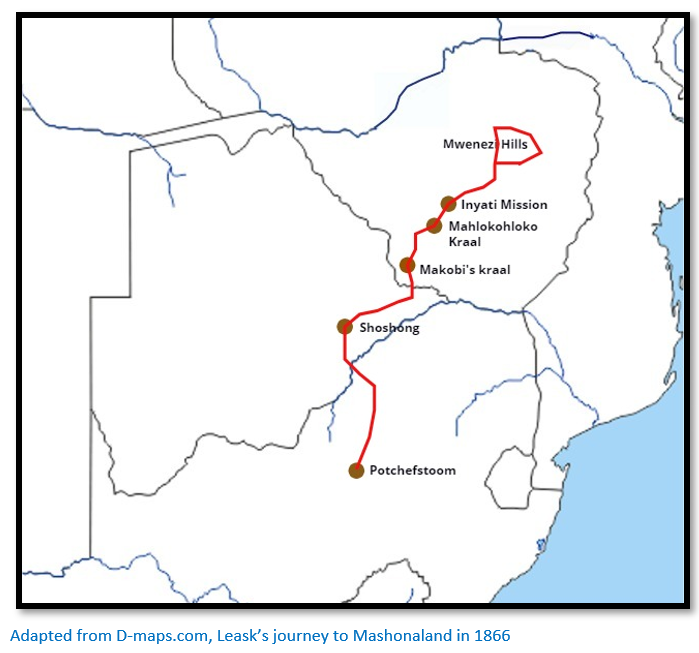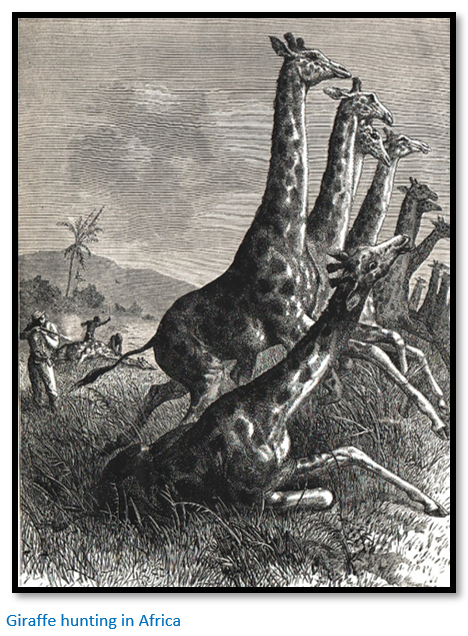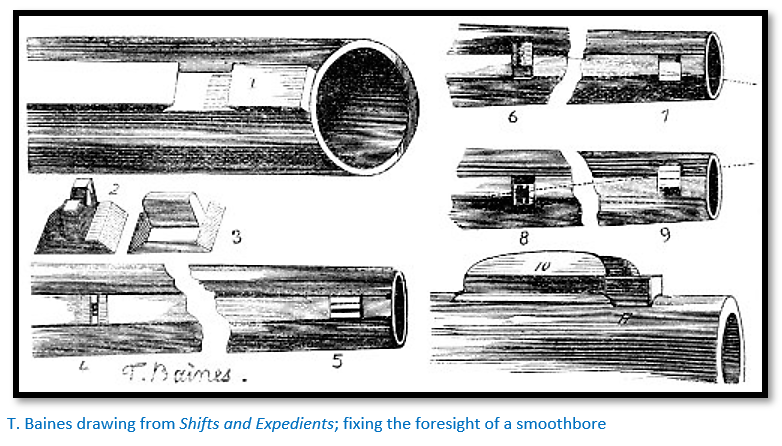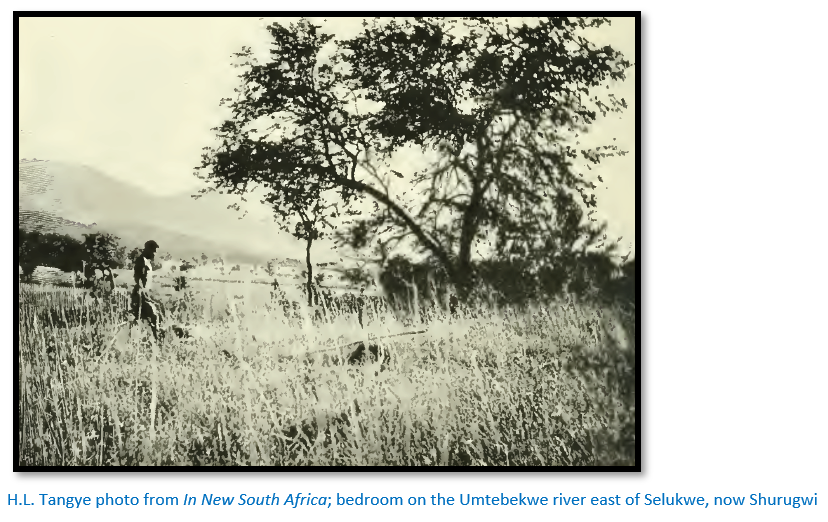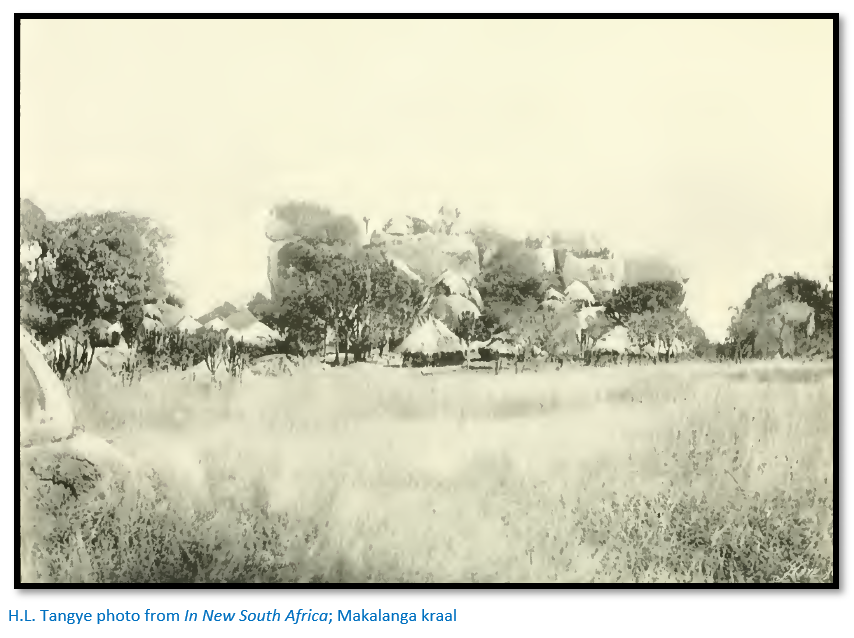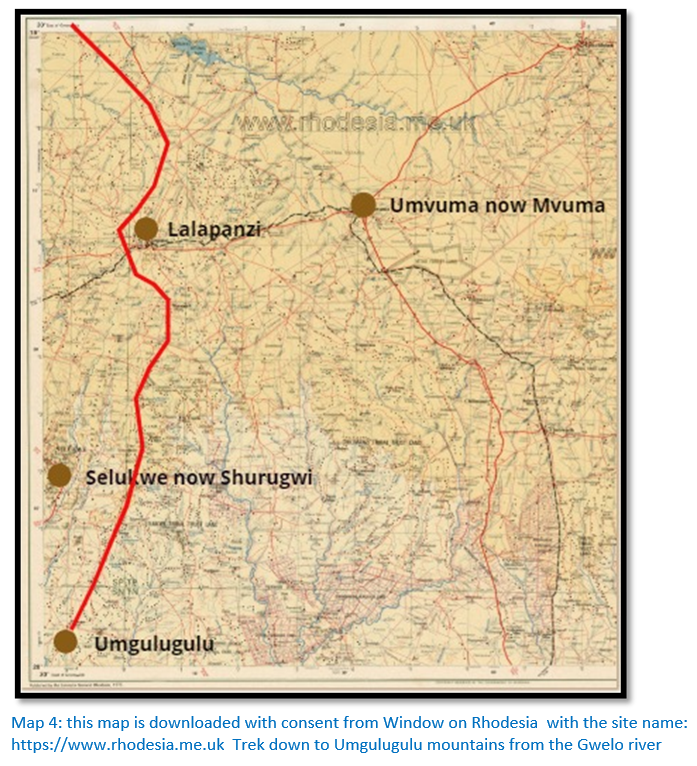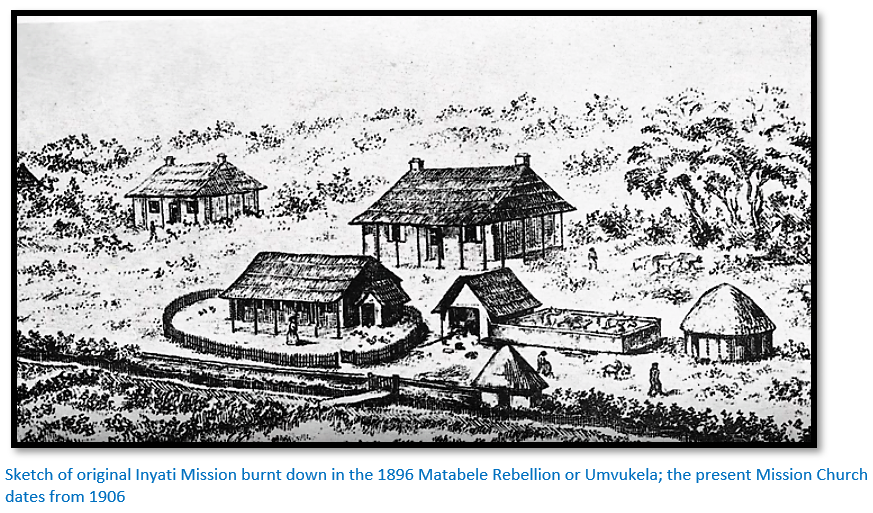Thomas Leask (1839 – 1912) and his first two hunting trips into Matabeleland and Mashonaland in 1866 and 1867
For background on the life of Thomas Leask visit the article Thomas Leask’s Life and Diaries describing Matabeleland and Mashonaland in the 1860’s which is under Harare on the website www.zimfieldguide.com
The Diaries
In his preface JPR Wallis, who edited the diaries states that Leask lets surprisingly few days go by unrecorded except when he was down with fever. He seems to have written them up whilst supper was preparing and things were quiet. His diaries reflect his character; companionable, discreet, never striving for effect; he was tolerant and fair-minded and light-hearted with local natives who liked him too.
He did not have the scientific curiosity of Thomas Baines about travelling; rather he enjoyed ‘the passing scene, the chance encounter, the vagaries of character, the camp-fire gossip’[i]
Leask realised that the white man’s impact on native society was often negative. He writes: “civilization is creeping slowly onward among the natives. But civilization in its infancy is in many respects less attractive than real heathenism. Many who see her [i.e. civilization] in that stage watch her sadly and accuse her of being the cause of many evil deeds.”[ii]
For source material I have used The Southern African Diaries of Thomas Leask 1865 – 1870 which were edited by J.P.R. Wallis. This article includes a brief sketch of his life; for details of his journeys there are longer articles on the website www.zimfieldguide.com
- His first journey into Bechuanaland in 1865 is not covered in detail.
- His journeys into Mashonaland and Matabeleland in 1866 and 1867 ‘My second Hunt’ and ‘My third Hunt’ are in the article under Bulawayo.
- His journeys to the Zambezi in 1868 and 1869 are in the article under Matabeleland North.
- His last journey into Mashonaland in 1870, because of the death of William Hartley, is included under Mashonaland West.
Leask calls this journey into Matabeleland and Mashonaland ‘My Second Hunt’ in his diary from 4 May – 15 December 1866
4 May - Leask left Potchefstroom with George Phillips, James Gifford, J. Fenwick Wilkinson[iii] Phil Smith and Phillips’ ox-wagon driver Shrigley for the Marico district in two wagons. By 16 May they are at the Notwani, now Ngotwane river.
26 May - They arrive at Shoshong. “There are two missionaries located here. Mr Mackenzie and Mr Price, both of whom are highly spoken of. There is some report today of a new chief being on the way to this place. There was some row between Sekhomi and his two eldest sons[iv] and as the former thought he was likely to get the worst of it, he sent for the proper chief…There are seventeen wagons here at present; six of which are going towards the Zambezi and seven to Moselekatze; we are of the latter.” They watched Macheng’s[v] arrival for his installation as chief before leaving the town. “The coronation of the new chief will come off in a day or two. I understand it consists in killing a cow, taking some dung out of the stomach and smearing each other’s hands and some other doctoring and nonsense.”
28 May - at the first outspan outside Shoshong they were joined by Edward Chapman, Richard Clarke and William Finaughty[vi] and Hans Hai.[vii] Travelling together they hunted for elephant at the Impakwi stream.[viii]
5 June - reached the Shashe river and found water below the drift.
6 June – reached the Tati river. Chasing a giraffe Leask rode too close to a tree and was tumbled off his horse onto his back. “Picked myself up as quickly as possible, looked for my horse and caught a glimpse of him disappearing in the bush close at the heels of the giraffe and following her up like a dog.” After walking a couple of miles he encountered Chapman who had found his horse and came looking for him.
8 June – crossed the Impakwi river. “The country trekked over this afternoon is the most picturesque I ever saw in this country; it is nothing but high steep hills and beautiful valleys. In some places there is barely room for a waggon between some of the hills.”
10 June – “Heard the report of guns this forenoon and a little before sundown the hunters returned. They shot four elephant this morning.”
13 June – “Moved on again about a hundred yards when Chapman gave a low whistle and started off at a gallop. Then for the first time I saw an elephant in his wild state. What my feelings were I cannot describe, but I shall honestly admit that when the monster, after getting the bullet, gave a scream, stuck out his monstrous ears and came thundering towards us, I say, when I saw this, fear was my strong feeling and to turn and run my only thought. And not mine alone, for everyone gave way. He only came about twenty yards and turned. We followed him and in the thick bush I lost sight of the elephant and his pursuers. Hearing a shot to the right I went in that direction and soon came up to Finaughty who was all alone with (in my opinion) a monstrous big bull. Seeing no other…I stuck to Finaughty. Certainly I could not help him much as, at the sight of the elephant, my horse got so excited that it took all my skill to manage him. He was not afraid, but awfully excited. After a while I managed to quiet him somewhat and gave the elephant a shot behind the shoulder. Tried to give him another and my horse gave a start and, big as the mark was, the bullet went wide of it. Finaughty all this time was loading and firing – it was his four-to-the-pound rifle – as quickly as possible. I loaded again, no easy job on horseback when the animal is excited and was trying to have another shot when Finaughty shouted; ‘He’s coming; look out!’ and sure enough he was coming. And an uglier animal than he looked then I never want to see. It was turn tail and run. He came about two hundred yards and stood looking as black as thunder. When he stood, we stood. When he moved, we followed him, firing all the time as quickly as we could.
Matters went on in this style until he charged three times…I looked over my shoulder to see if he was still coming and through that very nearly ran afoul of a thorn tree. Consequently I gave my rifle to Finaughty, his horse being comparatively quiet though far from being a perfect shooting horse. Finaughty put seven drams of the best powder in my rifle – 14 to the lb – and gave the elephant six shots, after which he stood with his head toward us, seemingly knowing that we wanted to hit him behind his shoulder…Finaughty got off, crept around the bushes and gave him a good shot behind the shoulder . He gave one stagger and fell to rise no more. I must say I was sorry for his fall tho’ I had helped in killing him. He fought bravely and succumbed only at death.”
16 June – “inspanned, trekked through a fine well-watered country and got to Manyami’s, Mosilikatsi’s first outpost, in the afternoon.”
21 June – left Makobi’s kraal with a guide and guard. “Both wagons stuck in the Shashani; had to hook two span of oxen to each…The country travelled over today is surely the most picturesque in Africa. It is all hill and valley. The hills being nothing but piles of huge rocks in every conceivable form, many of the top rocks appearing as if a touch would send them rolling down the hill…Every valley has its stream of beautiful water. We crossed twelve streams of clear running water today. The Garden of Eden must have been somewhere hereabout. ”
23 June – “Phillips, Gifford, Wilkinson and myself went out to provide something for the pot. Found nothing but some wildebeest; shot one, put some meat behind our saddles and returned to the wagons. Chapman came across three rhinoceros yesterday by the wagon-road, two of which they shot. They also shot an ostrich to-day.”
24 June - reach Mzilikazi’s kraal beyond the Umguza river. [Mahlokohloko kraal] “When about two miles from his place a messenger came to stop us and make particular enquiries whether there were any Boers among us. If so, they must turn back immediately…” The Hartley party arrived shortly after; both parties were here to seek Mzilikazi’s permission to go hunting.
25 June – “We all went to pay our devoirs to his majesty this morning. Found him seated in an armchair, an old balmoral cap on his head, a dirty blanket around him and a tiger kaross,[ix] outside his hut…After saluting the chief we sat down on the ground when I had ample opportunity to examine the great chief Moselekatze who has founded one of the chief tribes and has made his name terrible among the natives of all Southern Africa. There he sat, a frail palsied little old man in his second childhood, unable to move himself a yard. Still he is the chief. Every man kneels before him, every sound of his voice and every movement of his eye is instantly attended to…He spoke very little, beckoned for each one of us by turns to go and drink beer or eat meat with him, when anyone foolish enough to have a handkerchief exposed had the honour of being deprived of it by the chief. After sitting half an hour we were dismissed.”
26 June – “Went to the chief today and asked him to allow me to go ostrich hunting for some days and had for answer food, a drink of beer out of his cup and a large calabash of the same to take to the wagons.”
27 June – “I understand it is only for the last two or three years that he has kept moving about; before that he lived at Inyati. About three years ago his favourite wife died and ever since he has been unsettled.”
30 June – “Smith and myself went out for a hunt and Lobengula, one of the chief’s head sons, joined us.” Leask chasing a giraffe was caught up in some wait-a-bit thorn [Afrikaans wag-'n-bietjie] and was unsaddled. He fired a few shots and started off in the direction of the wagons. “In a few minutes Lobengula joined me and was not the least astonished to see me on foot. In fact he seemed rather pleased than otherwise; for he had had a tumble, lost his hat, lost his giraffe and sprained his wrist.”
1 July – Mavoma, one of Gifford’s servants caught a Matabele in the wagon after dark. The thief got away leaving his kaross and headdress and some beads which he had stolen behind him. “We went to the chief this morning, taking the kaross, etc with us. He heard us patiently and then told us we must look out, as all the majacas are thieves and, if we caught any of them, we were to shoot them or bring them to him.”
2 July – Hartley and his party are given Mzilikazi’s permission to go hunting in Mashonaland.
3 July – “Got leave to-day from the chief to go hunting. If they don’t stop us we shall get into the best country there is, viz., towards the Mashona country which lies, as far as I can learn, north-east of us.”
11 July - the combined party makes a start for Mashonaland: five wagons, fourteen white men and twenty-four horses. The Leask party made up of Thomas Leask, George Phillips, Gifford, Smith, Wilkinson, Stewart and J. Taylor and the Hartley party of Henry Hartley, sons Tom and Fred Hartley, his son-in-law Thomas Maloney, Christian Harmse, William Finaughty and Karl Mauch. Some of the party have dinner with Reverend Sykes at Inyati Mission.
15 July – “Hartley keeps us in amusement in the evening by relating the most wonderful tales and adventures that ever befall any person. There are such a number of them and they all happened to himself. I have often heard it said that he was fond of drawing the long-bow and from what I have heard him relate, I consider him the best hand at it that ever I met.”
“Hartley says he intends collecting all his manuscripts and getting them published. It may do for the people at home, who generally give more credence to lies than truth, but it won’t go down with old travellers.”
21 July – “Inspanned at sunrise; trekked over some rough country and got to a large fine river (Inquinquince) [another name for the Que Que, now Kwe Kwe river] The drift was very bad. Both Hartley’s wagons got stuck and it took a great amount of whipping and shouting to make two spans to each bring them out.”
23 July – “Saw several sights today, viz., five white and one black rhinoceros, one Harris buck which wounded one of our dogs, three cream-of-tartar trees and three palm trees, the latter over eighty feet high. Neither of the above had I see before, but one thing we did not see and that is what we are looking for – elephants.”
24 July – “outspanned at Sebakwe, the largest and finest river we have crossed.”
26 July – “An hour and a half’s trekking brought us to the river Umnyati [now the Munyati] a fine large river with high steep banks. The river bed at the drift – or rather where we crossed, for drift there is none – is deep soft sand. After hooking two spans to each wagon, we managed to get through all right. Hartley’s wagons did not get through so easily. There was whipping, sjamboking, belabouring with trees, abusing of k*****s, swearing, shouting, and oxen strangling each other, etc. enough to last any reasonable wagon-traveller for a whole year. However, we all got across and outspanned on the river bank.”
Inyoka their amaNdebele guide and Mzilikazi’s “spy” told them the wagons must not go further, but Leask notes that they intend to go on anyway.
27 July – “By sunrise we were in the saddle with a most murderous determination to kill every unfortunate elephant we could find. Went in an easterly direction toward the - range[x]…After riding for three hours over stony country…we found fresh spoor which we followed…they led us by a very roundabout way from one side of the mountain to the other, where we found them standing…We followed the spoor, Old Chris [Harmse] leading and came across one unfortunate small elephant to which Old Chris gave the first shot and I the last, which was the only shot I fired. I was not at all plucky ‘til I saw the elephant nearly done for. The game killed was six elephants; Hartley, his two sons and Cap [Wilkinson] three; Gifford one, Finaughty one and old Chris, Thomas Maloney and myself one.”
“…we left the spoor and struck out north until we struck the river Umgesi [Ngezi] a fine large river, along the banks of which we rode to within a mile or two of the wagons. The Umnyati and Umgesi join about two miles below where the wagons stand.
“Phillips and Mauch, a German geologist who is travelling with Hartley went over to Umgesi ; they were not out with me. Their dogs chased a water-buck which jumped into the river. The poor animal got about half-way across when he was seized by a crocodile which tried to drag it under water. The dogs jumped in after the buck and seized him. So there they were, the crocodiles – they saw more than one - pulling in one direction, and the dogs in another. Buck, dogs and all were pulled under three times. Phil says a crocodile had got hold of one of the dogs. The spectators of this scene succeeded in frightening the crocodiles and the dogs brought the buck to the bank, the latter dead, the former all but.”
30 July – “Inyoka is trying very hard to stop us going further and is dreadfully afraid of our getting into the ‘fly.’ However if we go any further, he throws off all responsibility.”
31 July – camp at the Sweswe [Umsweswe] river. “Old Klaas [Hans Hai] went out for a hunt on his own account and when he returned he had a wonderful tale to relate about an awfully big lion which stood in front of him and would not move away. Old Klaas made three attempts to shoot him but failed as the caps ‘had no fire.”[xi]
4 Aug – “Found the natives very shy and evidently much afraid. They had deserted their huts, left their corn and rice fields unreaped and burrowed in caves and holes among the rocks – the result of the Matabele raid about three months ago.”
7 Aug – Finaughty starts back on horseback for Matabeleland. “I rather think that Hartley’s party are glad that he has gone for he is a splendid hunter and any person wishing to get the first shot must be very smart to be before him.”[xii]
“About twenty Mashonas came to the wagons today bringing corn, meal and rice to be exchanged for beads…about sundown there was a disturbance at the Mashona encampment. Upon going to see what the row was about, found Inyoka sitting there, holding his gun and levying a blackmail in the shape of knives, spearheads, skins, etc. The poor Mashonas were afraid of their lives doubtless believing we would back up Inyoka. Soon put the set on his robberies however and made him return everything to its owner.”
11 Aug – The Hartley’s shoot four elephants, Gifford killed one which had chased Leask. “I was a yard or two in the rear, loading and was in the act of ramming down my bullet when someone shouted: ‘look out! He’s coming!’ And coming he was, trumpeting like thunder. I grasped the gun and reins in one hand and the ramrod in the other and sloped thro’ the bushes pretty sharp, straight ahead about a hundred yards and pulled up.”[xiii]
“Lions around us last night. Awoke in the night with a pressure on my chest; found it was no nightmare but a live mare standing on me.”
16 Aug – “Arrived at the camp a few minutes before sundown. Very low in spirits and rather hungry, having eaten nothing today. A good meal is a great source of consolation under disappointment and a hunter when enjoying his pipe by a good fire after having finished a good supper, looks with a sort of melancholy complacency on the toils and disappointments of the day.”
17 Aug – “Mauch who went out yesterday on a sort of exploring expedition, came upon five lions which got up in front of him. He wanted to get to a particular hill; the lions were between him and it and as they did not seem inclined to retreat to any distance, he merely waited until they moved a little, when he turned and mounted the first tree. He slept none that night but rested in a mopani tree.”
21 Aug – Leask chases a bull elephant. “Kept loading and firing until I exhausted one pouch full of bullets and when I wanted to begin at my other pouch, found it empty. It had got unbuttoned and the bullets were gone…Fired the last charge of powder; got bewildered and lest I should get lost entirely struck out for the wagons in a very bad temper. Arrived at the wagons two hours after sundown, hungry, tired and as cross as two sticks. The elephant charged me six times. Got at least fourteen bullets and then I came away and left him standing.”
23-24 Aug – Leask takes some of the servants and searches for the elephant he shot and although they found the blood spoor they did not catch up with the elephant.
28 Aug – “Inspanned at daybreak, trekked until 4 pm when we came to a halt near the source of the Sweswe [Umsweswe] where we intend staying for the present and go hunting tomorrow, all being well. [i.e. they have gone west around the northern tip of the Mashaba Hills and are almost on the watershed]
29 Aug – “Up-saddled at sunrise; rode towards the east to a range of mountains which run about north and south. These mountain are very rich in iron ore. The Mashonas get their iron from them.” [Wedza or Hwedza Hills]
30 Aug – “Heard some shots in the distance, turned towards them and got up just in time to hear the last scream of a young bull which Gifford, Finaughty and Fred Hartley had managed to murder with something like twenty-seven bullets.”
31 Aug – A troop of elephants passed within one hundred yards of the camp and could be seen in the moonlight.
3 Sep – they cross the Ngezi river and hunt down the west side of the Mwenezi Range where they killed ten elephants.
6 Sep – crossing the northern end of the Mwenezi through a pass they came across more elephants and killed two more. “Got to the wagons in the afternoon and learned that a lion had jumped into the cattle-kraal, frightened the oxen and killed one of Hartley’s”
10 Sept – “Old Baas [Henry Hartley] and Gifford went out hunting and the wagons trekked on to the river Inyati [Umniati, now Munyati] where we outspanned shortly before sundown.”
12 Sep – they re-crossed the Ngezi river and in the Mashaba Hills [the Great Dyke] managed to kill six elephants, two of whom were young calves.
14 Sep – “On our way to the wagons came across four white rhinoceros sleeping quietly under a tree…They quietly got up when we were within thirty yards and seemed not at all inclined to run for it…They walked along the path and we walked behind them, as if driving prize hogs to the show.”
15 Sep – “The hunters returned today having shot nine elephants and two rhinoceros.”
19 Sep – “inspanned at sunrise and started for Mosilikatsi’s direct.”
25 Sep – Wilkinson’s horse dies of horse-sickness although it had been sold as a ‘salted’ horse and cost £75. The next day one of Henry Hartley’s horses dies and another the following day.
29 Sept – at Inyati Mission. The missionaries tell them there has been panic amongst the amaNdebele who believe that an army of Zulu’s supported by Boers are coming to attack them, but the missionaries believe that Mzilikazi spread the report to test the courage of his people. “Mr Thomas who was one of the first missionaries recalled some of the annoyances which they used to bear with and truly the patience of Job could hardly have borne with it. The old chief is very fond of and kind to Mr Thomas and the latter has great influence with the former.”
3 Oct – at Mzilikazi’s kraal. “The old chief received us in a very cheerful and cordial manner. Asked how many elephants we had killed. Upon being told the number he replied: ‘That’s good for they eat my corn. He looked better than when we left him…We go to see the chief almost every morning and generally find him sitting in the goat-kraal, no matter how wet it may be. His wives carry him in his chair, set him down in the midst of the mud and water, put a tiger-skin under his feet, kindle a fire in front of him and then squat down by his side. All his attendants must sit in the dung and water; his white visitors are allowed to bring their stools.”
After we had been here a week two traders arrived from Sekhomi’s, Stewart and Taylor.[xiv] “We were startled one evening by the intelligence that Umchotcha, the head induna at the place, was killed by order of the chief at sundown. We were completely taken by surprise, all having seen and talked to the man in the afternoon and he seemed to be very much liked by the King. The poor man was killed about two hundred yards from the kraal and left lying there to feed the hyaenas and jackals…”
“At first my impression was that Moselekatze was a murderous blood-thirsty old wretch, but further enquiries have led me to modify my opinion. Umchotcha was accused of witchcraft by one of the chief’s sons and two indunas. Moselekatze would give them no answer at first but they were determined to have him killed and persevered in their treacherous work, bringing very many grave charges against Umchotcha who was never summonsed to answer them, until at last Moselekatze said: ‘Well, if he has done all that, go and kill him.’ They went immediately, committed the murder and returned to tell the chief when the deed was done.”
27 Nov – Leask spent November at the King’s kraal and says he found it monotonous.
29 Nov - Gifford moves the King’s wagons to a different kraal. “Left the old kraal and trekked to the present royal residence. Brought two of the King’s wagons with us. The wagons were full of a strange collection of odds and ends, all going to wreck – powder saturated with water, guns smashed, pots, kettles, etc, thrown in higgledy-piggledy.”
30 Nov – “went to see the old chief and wished him goodbye.”
1 Dec – the Leask party with Henry Hartley start from Matabeleland and keep together as far as the Transvaal.
The diary continues until 15 December and then Leask notes: “I find that the remainder of my diary has been lost. However we trekked slowly towards civilization, hunting for the pot by the way and reached Potchefstroom about the 1st of February 1867.”
Leask calls this “My Third Hunt” into Matabeleland and Mashonaland in his diary from 6 November – 15 December 1867
Mar 1867 – enters the Marico district where he spends some months nursing Baldwin,[xv] an old friend who had been crushed by a horse that fell on him. He helps another friend and his future partner, James Taylor whose wife is extremely reluctant for him to travel to Matabeleland by agreeing to go in his place and return an ox-wagon to its owner, a trader named Reader.
May 1867 – James Gifford joins Leask and they reach Shoshong where Leask buys the ox-wagon and £300 of trade goods; all on credit from Reader. Reader advises Leask to buy rhino horn which so far has been considered useless by traders. He gets a wagon load which he sells to Reader on his return; it clears off his debts and leaves him with a £100 surplus.
June 1867 – they reach Mzilikazi’s kraal and stay for five months - trading and mending the dangerously ill-made flintlocks that were sold to natives.
24 Oct – “Being wearied of some five months stay at Mosilikatsi’s kraal trading” Leask, John Jennings, Fred and Tom Hartley form a hunting party for Mashonaland and leave on the Hunter’s Road.
7 Nov – having crossed the Shangani river Tom Hartley and Jennings shoot two hippo on the Vungu river.
9 Nov – their guides advise that they are close to tsetse-fly and should travel east for six days to better hunting grounds. Fred Hartley and Leask chase down a rhino “the poor animal showed no hostile feelings until he was able to run no further…it is strange that an animal with such a huge body and such short legs should be able to go at the speed they do and keep it up, seemingly for any length of time. I never heard of a rhinoceros being run down unless wounded.”
12 Nov – “Inspanned at sunrise and had not trekked far when we saw two lions trotting over the plains…One dog, a little bolder than the others, seemed to approach too near, for she sprang up and showed herself in front of Fred Hartley who gave her a bullet in the mouth whilst she was grinning at him. One growl and she lay dead.”
16 Nov – It is raining heavily almost every day; a second lion hunt resulted in another lioness killed. Instead of bearing north-east on the route of the Hunter’s Road the party continues east and thus crosses the watershed south of present-day Gweru and east of Selukwe, now Shurugwi. Many of the place names are left blank in his diary or he refers only to “hills” so clearly the guides the party are travelling with are not that familiar with the names.
18 Nov – “rained nearly all day yesterday…the spruits (streams) were so numerous as to make travelling heavy for the oxen and unpleasant for the drivers. In one of these spruits one of my after-oxen got killed. The bank was very steep, so that the wagon tho’ riemed [i.e. the wheels are tied fast with leather thongs] drove the after-oxen before it…and pushed him to the opposite bank where he got under the wagon, jammed fast between the two front wheels.”
19 Nov – “Our first trek was a repetition of that of yesterday afternoon. It was one gully after another, with a hill between, in some places so steep that both wheels required to be riemed. Our second trek was even worse as we had to cross two very stony rivers in both of which all the oxen were necessary to pull one wagon across.”
20 Nov – “in the afternoon we came to a large white hill, standing all alone. It is formed of one large block of granite or some stone of that nature and is very steep, in many places almost perpendicular. Along the east side are strewn large rocks which have fallen from the top…In every available spot on top of these rocks are Mashona huts and corn houses…These Mashonas are subjects of Moselekatze but are seemingly wanting in confidence in his protection for when we approached their roost they fled up the steep rock driving their goats in front of them. They soon returned however, and brought us mealies and rice, ground-nuts and beans which they sold for beads…The above-mentioned hill is names Umkulu Kula [Wallis identifies this as Umgulugulu between the Musavezana and Tokwe rivers and thirty kms south of Selukwe] and must be at least six hundred feet above the surrounding plain. A battle was fought on its top between Matabele and Mashona.”
22 Nov – “There are no elephants on this side [of the Tokwe river]…we were treated to some music and dancing by the Mashonas. There were five reeds, as many calabashes with beans inside. These were rattled to the time of the tune, there was also a piano. The latter was composed of thirty keys and placed inside of a large calabash. The music was good and the dancing very lively.”
23 Nov – “Inspanned and trekked to Tokwe.”
24 Nov – they turn back owing to the onset of the rains and prevalence of tsetse-fly doing some hunting in the Gwelo river area as they return.
27 Nov – “Our spirits are considerably raised now that we have again reached the open country. It is truly a splendid piece of country on this side of the ridge, abundance of pure running water, plenty of grass and the air all that can be required.”
28 Nov – “Made a long day’s journey, crossed the ridge and slept at the top of the Vungu. Saw a great deal of game; shot four rhinoceros and one eland. The rhinoceros we shot principally for their horns. We could have killed several more, but the shortness of their horns saved them.”
2 Dec – “Trekked down along the Gwelo and came to the Hunter’s Road a little before sundown.”
5 Dec – “Rode as close to the ‘fly’ as we considered safe, crossed Gwelo and turned towards the wagons. Found fresh spoor, followed it about an hour when we came upon the elephants. They ran towards some thickish bush which they reached just as we got up to them. Kill four within a hundred yards of each other and one made his escape…They were four very fair old bulls. Old Piet fell off his horse twice and was chased by an elephant when running after his horse. He turned behind a thick bush and the elephant passed on.”
25 Dec – have Christmas dinner with the Sykes family at Inyati Mission.
Thomas Leask leaves the following note; “Another part of my diary has gone missing, but as it could only have contained particulars of my journey back to Sekhomi’s for supplies, I need not trouble about it…on my return to Sekhomi’s I was not only able to pay Reeder for the wagon ang goods he had given me on credit but had a surplus of nearly £100…When I set out on my expedition he told me to take all the rhinoceros horn I could get. As no trader had hitherto taken any of it, it was considered of no value by the Matabeles and consequently, I picked up almost a wagon load of it and Reeder gave me a very good price for it.”
“I reached Bamangwato,[xvi] Sekhomi’s town about the middle of April 1868.”
References
W.B. Lord and T. Baines. Shifts and Expedients of Camp Life Travel and Exploration. Horace Cox, London 1871
E.C. Tabler. Pioneers of Rhodesia. C. Struik (Pty) Ltd Cape Town 1966
H.L. Tangye. In New South Africa – Travels in the Transvaal and Rhodesia. Horace Cox, London 1896
J.P.R. Wallis. The Southern African Diaries of Thomas Leask 1865-1870. Chatto & Windus, London 1954
[i] The Southern African Diaries, Pvii
[ii] Ibid Pxxxviii
[iii] Wilkinson was nicknamed ‘Cap’ because he had the rank of Captain in a colonial regiment.
[iv] Khama and Kgamane
[v] Macheng succeeded his father Chief Sekgoma I after his father’s relationship with Khama broke out into conflict and Sekgoma attempted to assassinate Khama. Macheng and Khama also clashed and there was another botched attempt against Khama’s life who then ousted Macheng.
[vi] Willian Finaughty traded and hunted from Shoshong and killed about 500 elephants.
[vii] Leask calls him “Old Klaas.”
[viii] The last photograph in this article shows Edward Tabler and friends at the Impakwi river.
[ix] Probably a leopard skin.
[x] Mashaba Hills, part of the Great Dyke.
[xi] Many flintlocks were converted to fire percussion caps.
[xii] The first hunter to hit an elephant generally claimed it as his trophy.
[xiii] The Southern African Diaries, P84
[xiv] James Taylor who later became Leask’s partner at Klerksdorp.
[xv] This is not William Charles Baldwin, author of African Hunting from Natal to the Zambezia
[xvi] Shoshong is often referred to in contemporary accounts as Bamangwato.

